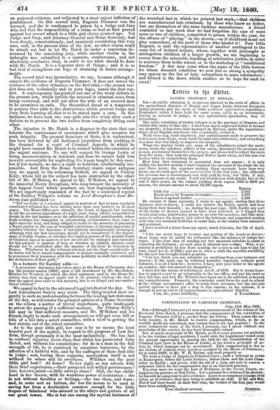COMPENSATION TO PARDONED CRIMINALS.
City, 15th May 1860. Sra—Although I have not yet seen any announcement of the release of the Reverend John Hatch, I presume that the consequence of the conviction of Eugenia Plummer will be a pardon from the Crown. Then comes the na- tural inquiry, is Mr. Hatch to receive compensation, which, so far as worldly goods are concerned, may restore him to his lost position ? In the mere commercial sense of the word, I presume, but I speak without any knowledge of the convict, he has been thoroughly ruined. Not so much on account of Mr. Hatch, as of accused persons yet probably to be the victims of legal accidents, I could wish the Legislature would seize the present opportunity in passing the bills for the Consolidation of the Criminal Law (now in the House of Lords), to lay down a principle of ac- tion, by which damages can be ascertained. That compensation is due to the victims of judicial error, has been accepted by the House of Commons ; for it voted 50001. to Mr. W. H. Barber, and most properly so. We want a Judge of Appeal in Criminal Cases' such a tribunal as exists in Bankruptcy, before the Lords Justices; before them and the Lord Chan- cellor in Equity ; and power, with the aid of a jury, not only to reverse a judgment, butte fix the compensation due to an innocent prisoner. Yet even more we want the Law of Evidence, in the Crown Courts, en- larged to the practice at Nisi Prins. Let a prisoner be a witness if he chooses ; let his wife be competent to give evidence. Ajury is as competent tojudge of its value, as of evidence they may bring to establish an alibi. If Mr. and Mrs. Hatch had been heard on them first trial, the verdict of the first jury would have been satisfactory.
Your obedient servant,


























 Previous page
Previous page